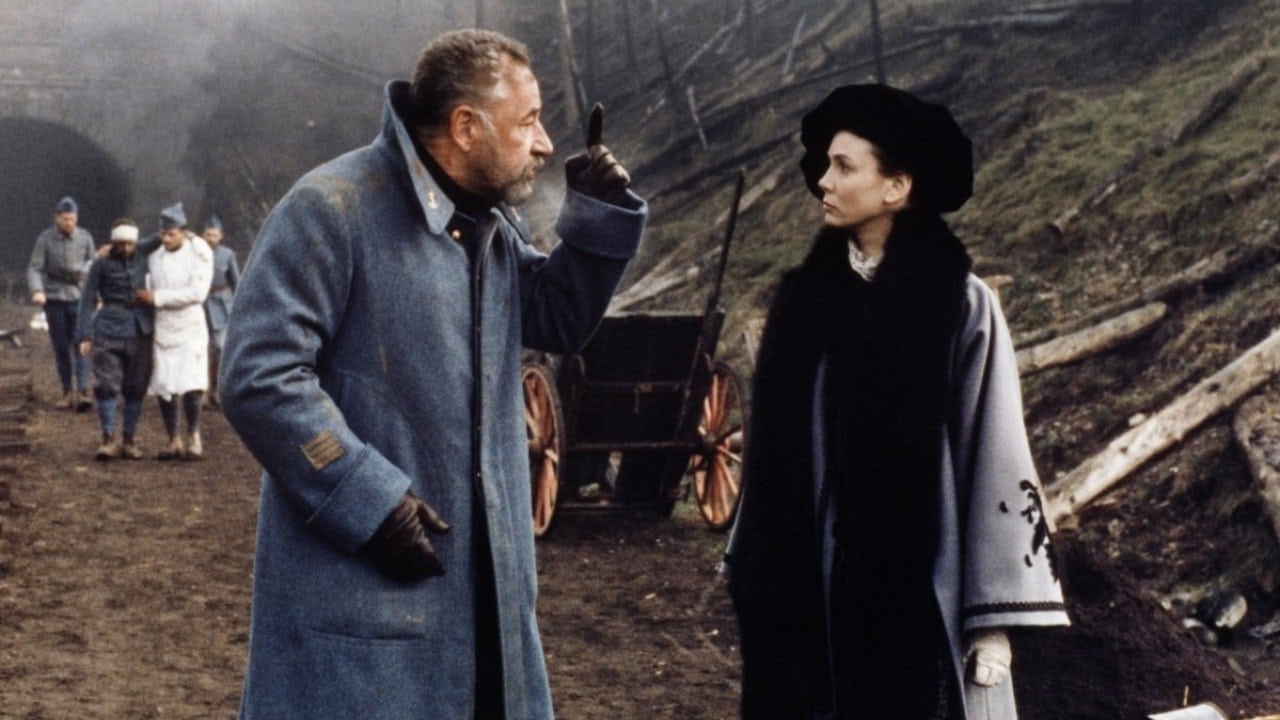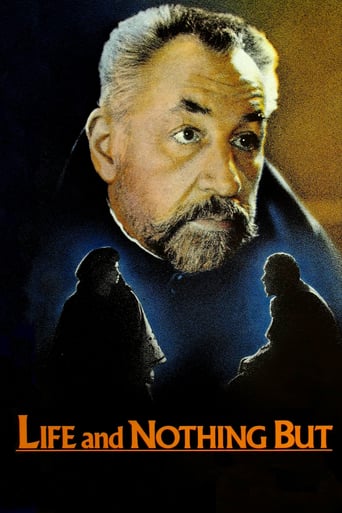

What a waste of my time!!!
... View MoreA Brilliant Conflict
... View MoreWorth seeing just to witness how winsome it is.
... View MoreA terrific literary drama and character piece that shows how the process of creating art can be seen differently by those doing it and those looking at it from the outside.
... View MoreDirector Bertrand Tavernier dares to show the true futility of warfare and the hypocrisy behind every call to arms by revealing how the so-called Great War (like every other war before or since) didn't end with an armistice, except of course for the dead. Phillipe Noiret stars as a military statistician assigned to account for the missing and identify the deceased; his expertise is sought by two women, strangers to each other but linked by a terrible secret.Noiret's character is that rarest of silver screen creatures, a middle-aged hero, and of truly heroic (but no less lifelike) proportions: competent and compassionate while at the same time flawed and uncertain. Over the course of his investigation he discovers firsthand the legacy of state-approved wholesale slaughter, and learns that after four years of bloody trench warfare some graves are best left unturned. With delicate insight and strong but subtle irony the film succeeds in putting a human face on the true victims of any war: not just the dead and disabled, but the civilians caught in the crossfire.
... View MoreThere are at least five stories in Life and Nothing But, and most of them could make a movie in themselves. There is the story of Major Delaplane (Philippe Noiret) who in 1920 has the task of trying to identify the 350,000 French soldiers who remain on the missing roles. There is the story of the hypocrisy behind the choosing of an unknown soldier who eventually will be buried with great pomp and honors beneath the Arc de Triomphe. There is the story of Irene de Courtil (Sabine Azema), married to a missing soldier who comes from a rich and privileged family. There is the story of Alice (Pascale Vignal) whose fiancée and lover was last seen in a battle where hundreds of soldiers were wounded or killed. And we have the story of the thousands of wives, parents, brothers and sisters of those 350,000 missing men who, nearly two years after the end of WWI, still have no idea of what happened to their men...are they alive, are they dead, are they horribly wounded, are they forgotten in some hospital or mental ward? Delaplane is an army officer who is consumed by his job of identifying the missing, of finding corpses and tracing who they were. His superiors think he is reckless and unreliable. The generals, the politicians and the industrialists want nothing more than to let the missing stay missing. That way bad decisions and pointless battles may escape notice, and protected factories can go back to business. Delaplane is even more cynical as he sees the rush to find the remains of an unidentified soldier to be honored in Paris. He has to deal with the aristocratic Madame de Courtil and with the schoolteacher, Alice. He is brusque and cynical, yet he is dedicated to finding and identifying every one of those 350,000 missing men that he possibly can. One long, outstanding sequence takes place in a huge, unstable railway tunnel. Toward the end of the war a train carrying munitions, gas shells, supplies and a car full of wounded soldiers entered the tunnel. The Germans in retreat had mined the place and it blew. Now, two years later and deep in the tunnel, Delaplane is trying to dig through the rubble, the unexploded gas shells and the torn tracks and find the car of bodies. In the field nearby relatives are waiting. Soldiers are sifting through dirt and rubble to find traces of bodies and belongings. Tables have been set up holding every manner of object which have been recovered so far, some matched with the bodies they were found on. People pass by the tables trying to find something that would tell them the fate of a loved one. They don't expect life; they just want closure. Tavernier holds these stories together thanks to the power of Philippe Noiret as Major Delaplane, to the power of outrage at what Delaplane is up against, and to a script which manages to combine sardonic humor with a look at what the bureaucracies of war do to the men who fight the wars. This is not a grim movie, but a poignant and sad one. "One patriotic song and off they go to war," says Irene de Courtil to Delaplane. They had been seated at a small restaurant where a black jazz band had been playing. Then a French woman came on stage and sang a song of how we can fight and then be comrades. The young soldiers all stood and joined in the song. So did Delaplane. "It's a club," she says fiercely to Delaplane. "It will be a club for years to come, this club of those who won the war. And the losing side will have its club, too. You know why I think of clubs? Because women aren't admitted! Nothing scares you men more than women, their wombs, their courage, their watching eyes..." And yet, as a friend and sculptor points out to Delaplane, the remains of the war now mean great business. "It's the Golden Age, my friend," he says. "Nothing like it since the Greeks, since the cathedrals. Even mediocre artists have their hands full. A monument per village. Three hundred sculptors for 35,000 towns. Everybody wants his doughboy, his widow, his pyramid, his marble, bas-reliefs, inscriptions. It's a factory. Better than the Renaissance. It's the resurrection." "Thanks to our dead," says Delaplane. Eventually the stories come together. The unknown soldier is selected with pomp and cynicism. Says Delaplane, "Officials are reassured by the story of the unknown soldier. They had a million and a half men killed, and now we'll only think about this one." Delaplane discovers the fate and identity of Irene's husband and Alice's lover. There are some twists and turnings. While each major character either chooses or is forced to choose life, the future for Delaplane and Irene is indefinite. On balance, while I liked this movie a lot, there still are probably too many things going on for Tavernier to handle with complete success. Still, it's always a satisfying experience to see Philippe Noiret, with those shrewd eyes and bloodhound eye lids, take on a role of real substance.
... View MoreI watched La vie et rien d'autre, about a year ago. Well, it stuck with me. And I really wanted to see it again. So I watched it a second time. And some things became clearer to me. The central message obviously that war sucks, that war is a disaster for everybody. And nothing should be done to hide this truth from anybody. That's Delaplane's belief, that's his fight, his moral code. And yes, there is a love story coming to interfere with his dull and depressing duty. Why people can't see that a man such as Delaplane could not handle love, specially while in the middle of such an ugly struggle? I read some negative comments about this film. I just could not understand that. This is a beautiful movie, touching, a bit slow certainly, but the topic does require that we take time to learn all the details so as to better understand the nature of this human drama. What pushes all these people to look for remnants of their loved ones, just to have proof of their death. For what? This we may never understand for not having to live through this. Go ahead, watch this movie. It's not a big action movie, no, it's a reflection movie. A movie that a lot of people who see war as something that's glamorous should have seen, but probably never will... alas!
... View MorePhilippe Noiret plays a military bureaucrat who is meticulously trying to catalogue the casualties of WWI. He and two women cross paths during the excavation of a train that was buried in a tunnel by German explosives. This would make for a great existential movie, but it's all talk talk talk. The dialogue is endless, and, with the long running time, the whole picture seems that way, too. The film would be much more powerful if it demonstrated its themes more visually. Instead, the emotions come off as somewhat flatter than they deserve to be. The production is also poor; it feels like it was made for television. And the musical score is so weak it takes the film down a peg itself. It's still worth watching, but I think it really could have been a lot better.
... View More